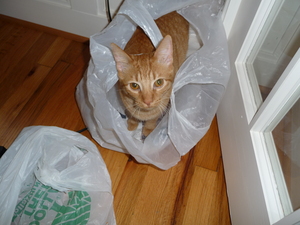First H1N1 pet death reported in United States

H1N1: a cat out of the bag?
photo courtesy of Laura Stroud
An Oregon cat died from a presumed H1N1 infection on Nov. 7, approximately one week after a child in the household tested positive for the virus. The cat developed labored breathing, and died three days later from pneumonia complications. The cat tested positive on initial testing for the virus, and a second test from the National Veterinary Services Lab is pending. Three other cats in the household also developed respiratory symptoms, but tested negative for H1N1.
Two additional cats and four ferrets have now been confirmed infected with H1N1; all presumed infected by humans in the household. All have responded to aggressive symptomatic treatment. Interestingly, the cats who survived were 13 and 14 years old, respectively, reminding us that owners of elderly cats should seek veterinary advice immediately if respiratory symptoms develop. There is no evidence that pets can give the virus to humans.
To date, no dogs have tested positive for H1N1, although they do become infected with H3N8, or canine infuenza, which is not contagious to people. There is a vaccine available for H3N8, but no vaccine against H1N1 is available for pets. As always, if your pet is showing respiratory signs, like coughing, sneezing, runny eyes, lethargy, not eating, or difficult breathing, consult your veterinarian as soon as possible.
If someone in your household is sick, observe the same precautions with your pet as you would with other people. Wash your hands often, cover your coughs and sneezes, and minimize contact with your pet until 24 hours after your fever is gone. Remember, the likelihood that your pet will contract H1N1 from you remains very, very small.
Read more on the American Veterinary Medicine Web site and on the Centers for Disease Control's Web site.
Dr. Cathy Theisen is a relief veterinarian in Ann Arbor, with 23 years experience in small animal medicine and surgery. Comments to cathytheisen@comcast.net.


Comments
Cathy Theisen DVM
Tue, Nov 24, 2009 : 9:18 p.m.
I'd say it's really unlikely that your cat would contract the virus from a child's live vaccine. But, generally, the symptoms in these cats are occuring 7-10 days after exposure to a symptomatic human.
EngineeringMom
Tue, Nov 24, 2009 : 10:58 a.m.
Doctor Theisen, is there any risk of a child vaccinated with the live nasal virus infecting their cat? If so, for how long could they be contagious? How long would it take to see signs of illness in the cat?